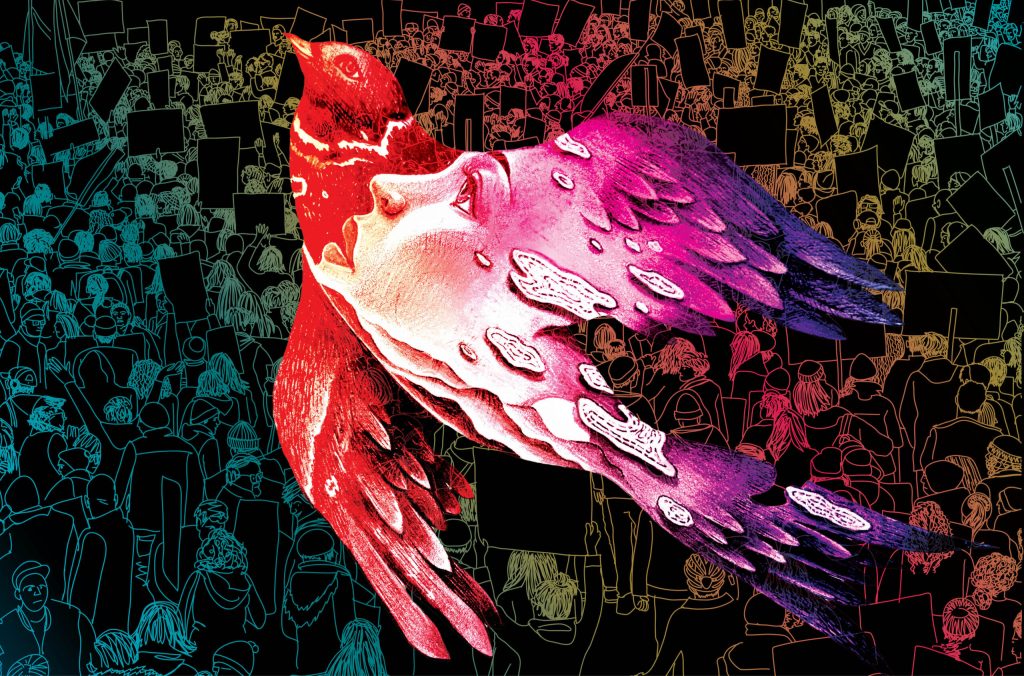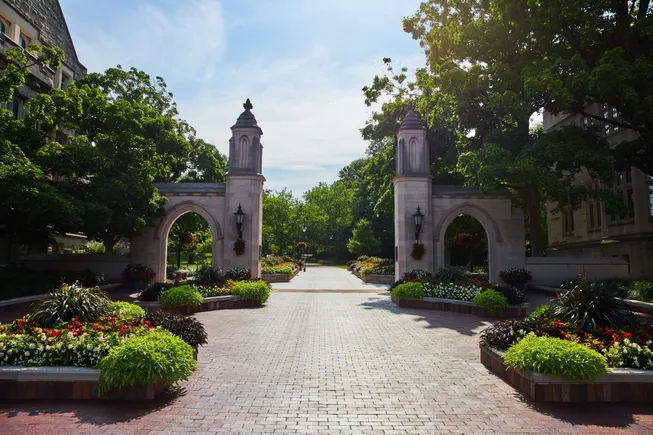
“It is clear that any restriction on academic freedom hinders the dissemination of knowledge in the population and therefore restrains rational judgement and action.”
—Albert Einstein
“It is clear that any restriction on academic freedom hinders the dissemination of knowledge in the population and therefore restrains rational judgement and action.”
—Albert Einstein
By Jean-François Venne
Academic freedom is at the heart of universities’ missions, but political polarization around the world has made it a prime target for some groups and governments. Canada is not immune.
In Quebec, Minister of Higher Education Pascale Déry recently asked Dawson and Vanier colleges, both in Montreal, to stop offering two courses on Palestinian literature. Déry said she wanted to avoid exacerbating campus tensions related to the Israel-Palestine conflict. She also blocked Professor Denise Helly, who specializes in discrimination, hate crimes, and freedom of expression, from being appointed to the board of Quebec’s Institut national de la recherche scientifique, due to her alleged ties to the controversial imam Adil Charkaoui.
In Alberta, the Provincial Priorities Act requires all provincial entities to obtain prior approval from Alberta government before entering into, amending, or renewing funding agreements with a federal body. The initial bill specifically targeted post-secondary institutions and their research funding, striving to align academic research with Premier Danielle Smith’s UCP government’s priorities and ideology. The bill ultimately granted several exemptions to the post-secondary sector.
In Nova Scotia, Tim Houston’s Conservative government has adopted Bill 12, which threatens institutional autonomy and academic freedom. Since 2015, institutions facing economic difficulties have been able to voluntarily ask the government to draw up a “revitalization” plan. This mechanism would temporarily suspend collective agreements and the right to strike. “The new law gives the government the right to externally impose a revitalization plan on universities,” notes Peter McInnis, associate professor at St. Francis Xavier University in Antigonish. “These measures can include restructuring programs or eliminating certain courses, which greatly increases the risk that governments will also dictate universities’ economic and ideological priorities.”
Bill 12 also enables the provincial government to impose research restrictions on Research Nova Scotia, the not-for-profit corporation responsible for funding research in the province. The government can also appoint the majority of university board members under this bill. “Universities’ autonomy and academic freedom manifest in their governance and research direction,” explains Dr. McInnis, “both of which are threatened by this new bill.”
Federal politicians are not exempt from this trend. During the last election campaign, Conservative leader Pierre Poilievre said that if elected, he would cut funding for university research on “woke” topics.
“It shows that Canada is not immune to the shifts occurring in the United States,” noted Robin Whitaker, president of the Canadian Association of University Teachers.
A Global Phenomenon
In 2023, the Academic Freedom Index identified downward trends in 23 countries, including the United States, the United Kingdom, India and Russia. Academic freedom improved in only ten countries. More than 40 per cent of the global population lives in a country where academic freedom doesn’t exist. Canada was ranked the 42ndmost academically free country worldwide, with the US ranking 88th (before President Donald Trump’s re-election).
The Index shows that academic freedom tends to decline in countries with growing political polarization. As nationalist and illiberal parties come into power, they are quick to attack academic freedom, freedom of the press, and judicial independence. Examples include the Hungarian government under Prime Minister Viktor Orbán, the Indian government under Prime Minister Narendra Modi, and, of course, the U.S. government under Trump.
Robert Quinn, founding executive director of Scholars at Risk, argues that “these governments are trying to cast academic freedom as an expression of elitism, as if the role of universities consisted only of producing opinions and ideology rather than protecting a rigorous culture of research that generates knowledge.”
Social polarization, meanwhile, is creating barriers for researchers who want to study and discuss controversial issues such as climate change, vaccines, immigration and gender. Polarization can hamper anything in the classroom from word choice to subject matter. Some professors even fear being taken to task by their students.
This pressure encourages instructors to self-censor. “Of course, it’s important to be sensitive,” says Chantal Pouliot, professor of Education at Université Laval. “But to teach critical thinking, we must also be able to tackle difficult questions. There is a social cost to no longer teaching certain subjects.”
A similar debate is surfacing around equity, diversity and inclusion (EDI) policies in research funding, notes Arnaud Bernadet, professor of French Language and Literature at McGill University. Though he believes EDI is justified in many areas, including hiring, he also feels imposing it as a research condition can restrict academic freedom.
Mirroring the far-right’s obsession with forbidding certain theories or concepts, he argues, the political left tends to impose its ideology through insisting on the use of a certain vocabulary, especially in federal research funding bodies. For example, he said, anyone submitting a grant application must now accept a priori certain concepts such as intersectionality or systemic racism.
“This challenges the scholar’s right to freely choose a research topic and theoretical framework,” says Dr. Bernadet, co-author of the essay “Liberté universitaire et justice sociale” (“Academic freedom and social justice”). “It can also create an opening for other political movements to impose their own ideology and concepts, once they come to power.”
Recognizing Academic Freedom
The current situation shows that academic freedom can never be taken for granted. But to adequately defend academic freedom, it’s necessary to first agree on its definition and scope.
Dr. Pouliot proposes the definition set out in Quebec’s Act Respecting Academic Freedom in the University Sector (Bill 32), which itself draws on UNESCO’s definition: “the right of every person to engage freely and without doctrinal, ideological or moral constraint in an activity through which the person contributes to carrying out the mission of … an educational institution.”
For Dr. Pouliot, who sat on Quebec’s Independent Scientific and Technical Commission on the Recognition of Academic Freedom in Universities (Cloutier Commission), this definition correctly identifies to whom this right belongs: “Any person whose activities contribute to the university’s mission to produce and convey knowledge has the right to academic freedom.”
Academic freedom does not generally extend to administrators, but they are still responsible for recognizing, promoting and protecting it. Yet, as Dr. Pouliot points out, administrators do not always know how to fulfill this role. Administrators have been criticized for their handling of number of controversies, including that of Verushka Lieutenant-Duval at the University of Ottawa (who was temporarily suspended for including a racial slur as an example of language reappropriation), Valentina Azarova at the University of Toronto (whose hiring was put on hold after a donor and alumnus expressed concerns about her analyses of Israel-Palestinian affairs), and Patrick Provost at Université Laval (who was suspended after questioning the use of RNA vaccines for COVID-19).
The Risk Posed by Precarity
Louis-Philippe Lampron, a professor of Law at Université Laval and co-author of the book Collegiality! (In all collegiality!) notes that the role of academic freedom is not solely to protect researchers and instructors. It applies to more than just individuals and is more than a mere privilege granted by collective agreements.
“Academic freedom is institutional in nature, like freedom of the press,” he maintains. “Both ensure that people can access knowledge and facts upon which they can base their own free speech and participation in democratic life.”
Academic freedom is thus about protecting individuals and their autonomy, whether within or outside of institutions. But it is also about the autonomy and independence of the institutions themselves: their freedom from interference by governments, funding bodies and pressure groups. Individual and institutional precarity pose a threat to academic freedom by undermining the people and institutions that must practise and protect it.
“The biggest threat to the academic mission, and by extension to academic freedom, is economic pressure,” says Madeleine Pastinelli, President of the Fédération québécoise des professeures et professeurs d’université (Quebec federation of university professors — FQPPU). “Much more so than misguided interference by a minister or the ideological sensitivities of certain students.” Universities’ financial precarity is currently exacerbated by restrictions on international student admissions. Institutions have long relied on their tuition to compensate for public underfunding.
This precarity makes universities more vulnerable to pressure from the private sector, donors, and in some cases even governments, who may be tempted to direct more and more research funding toward their own priorities.
This precarity is not limited to institutions. “The academic freedom of tenured professors tends to be protected by their collective agreements, but universities are hiring more and more instructors on contract,” notes Dr. Whitaker. “It’s not at all clear that their freedom is as well defended.”
Protecting and promoting academic freedom
Academic freedom clearly faces a variety of threats. How to defend against them? Mr. Quinn says it’s a weakness that academic freedom in Canada is usually protected only by collective agreements. Quebec recently attempted to address this problem through Bill 32, with mixed results.
The bill requires universities to set up committees, representative of the institution’s community, to examine complaints about academic freedom and make associated recommendations.
“But there isn’t much faith in these committees, and professors generally prefer to file grievances when their academic freedom is challenged,” notes Dr. Pastinelli. The FQPPU has expressed disappointment in how little effort administrations have put into promoting academic freedom — another requirement of Bill 32.
Notably, section 3 of the bill states that the right to academic freedom “must be exercised in accordance with the standards of ethics and of scientific rigour generally recognized by the university sector.” But Dr. Pastinelli argues that some administrations tend to use scientific rigour as a justification for restricting academic freedom.
Defending academic freedom against government infringement is no mean feat. Mr. Quinn feels that, especially as the U.S. political climate deteriorates, universities must combat isolation and fear, while refusing the binary choice: obey or perish. “The longer we resist, the more time we have to build coalitions and strengthen ourselves,” he says. “Above all, we must help the public understand that everyone’s freedom is under attack, not just that of the universities.”
To Dr. Whitaker, this is a crucial distinction. Politicians are comfortable publicly attacking academic freedom only because they think they can score points with their base without paying a political price. “In addition to exercising every facet of our academic freedom,” she says, “we must relentlessly explain how it works and show how it benefits society as a whole.”








